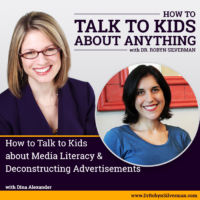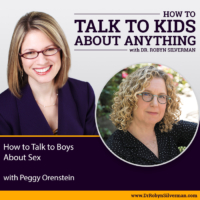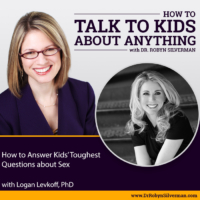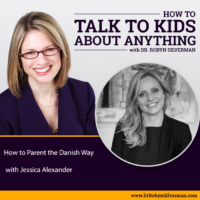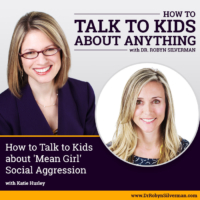Podcast: Play in new window | Download
Subscribe: Apple Podcasts | RSS | More
How to Talk to Kids about Sex
This podcast will focus on talking to kids about sex. Dina Alexander, founder and president of Educate and Empower Kids (educateempowerkids.org), discusses how to talk about all kinds of “taboo” or uncomfortable topics related to anatomy, relationships, intercourse, consent, intimacy, porn and more. Haven’t had a conversation with your children about sex yet? I get it. But you want to be the one they get the right information from before they hear about it from someone else, right? Of course you do! Start here.
Special Guest: Dina Alexander
So who wants more information about how to have THE talk with their kids. You know the one. THE SEX TALK! This is one of those conversations that often makes us all squirm in our seats and yet, gotta have it. And remember, while you may not be talking to your kids about sex yet, you’ll need to talk about it at some point—and likely sooner than later, no matter what your family values are and what you personally think your children should or shouldn’t be doing. And for those of you who have already been in the thick of it—perhaps you’ve already had a discussion about privacy, your child’s body or sex itself – remember, it’s never one big talk, but a series of little ones, so this podcast can help provide you with one, two or three extra nuggets you might not have thought of yet when the topic comes up again. And you know it will! It always does.
The podcast provides:
- Tips on what types of tough conversations about sex we must have with kids–from discussions about anatomy and how to protect our body to how to discuss predators, online safety and intercourse.
- Great conversation starters that help initiate a conversation about sex, anatomy and porn.
- Important conversations we need to have from sexting and porn to the mechanics of sex, intimacy, our amazing bodies and more.
- Information about how to deal with your own mistakes when it comes to sex, partnerships, relationships, etc. Use your mistakes as a teaching tool!
- How to talk the shame out of discussions about masturbation, predators, sex and bodies.
- Why we need to give our girls a mirror.
- Why we must talk to our kids about pornography—many kids are being raised on a diet of pornography.
- How to create a plan if our kids are asked if they want to see porn or if they do see porn.
- How to be the source for your child so they will keep coming to you about tough conversations.
Important Messages:
- We have been socialized to belief that talking about sex is awkward and uncomfortable but it really doesn’t have to be.
- Determine what is making you feel fearful or uncomfortable. Ask yourself; what am I scared about?
- Information does not steal innocence- we need to empower our children with knowledge. We can help them be smart about where to get information—from us!
- These may not be the conversations you are thrilled to have but they are necessary!
- Start the conversation where you are comfortable. Maybe you are most comfortable starting with just how amazing our bodies are, or what they can do, and that it’s worth protecting- rather than starting with intercourse or anatomy.
- We have to have a goal in mind. Maybe your child is really young- and your goal might be protective information. So have a conversation about your child’s amazing body, their anatomy so they know how their body functions and work.
- Take your child’s “temperature” so you can determine what your child knows before you begin the conversation—and meet them there.
- You have an opportunity to put your standards and values. Your kids need a guideline. Tell them when you think it’s appropriate to have sex. You need to express your honest views. What do you value? Bodily integrity, intercourse—all of these need to be discussed.
- Use your mistakes to educate your kids.
- We need to talk about what a healthy relationship looks like.
- So much of our kids’ social relationships are happening on line—we must talk about them.
- We need to talk about pornography with our children because, unfortunately, it has become the top sex educator for kids as technology is constantly present. The porn industry is a very inaccurate depiction of what healthy relationships, sexual relationships and healthy sex looks like. We can’t ignore it.
Notable Quotables:
- “When I approach difficult topics with my kids, I’m letting them know that one—I’m a source and two, I care about them enough to talk about these things. They will tell you story after story of their friends’ parents who will not talk about these things and I don’t want to be that parent. I want to be the parent that says ‘you can ask me anything.’”
- There are a lot of parents who feel that they are going to take their child’s innocence if they talk about these topics. And I say; that is garbage. This is about empowering your child with knowledge. Knowledge and information do not steel innocence.
- Parents; you be the first source. When we start these conversations early, we let them know that: I am the source of honest information. I am the source that is going to answer your questions compassionately and kindly. That’s when our kids will come back to us with other really great questions. And that’s a good thing. We want to be the source.
- “If my child is old enough to ask it, I’m going to answer it.”
- Even on the topic of the mechanics of sex—we’re super uncomfortable, we don’t want to do this, we don’t know where to start– start where you feel comfortable.
- Did your child see pornography? Don’t start yelling and screaming. Have the conversation. What have you seen? What do you think about that? Tell me about it. How did it make you feel? Do you think that’s an accurate portrayal of sex? Use these everyday opportunities to start these important conversations.
- We have to remember, these conversations are not about us. They are about our kids. What do they need to know? What is going to help them to become happy, successful adults?
- “It’s OK to say; I made mistakes. I messed up, I wished I had waited a little longer, or for a different type of partner who was committed to me or loved me. It’s OK to say those things. Use your mistakes as a teaching tool. I use my mistakes to talk about math or driving. Take that trepidation away from this discussion. If you made mistakes, use them.”
- “These are not discussions we have one time. They happen in layers.”
- “We get so hung up about the mechanics of sex that we forget to talk about the emotional part of sex.”
- We need to talk about healthy relationships very early on; talk about what a healthy relationship looks like, not just an unhealthy relationship. We see unhealthy relationships everyday on television over an d over again shoved down our throats so we need to model and discuss healthy relationships with our kids.
- Girls need to know what their vagina looks like. This is just a normal part of their body. Girls can’t see their vagina just by looking in the mirror. They need to know what it looks like. They need to understand the difference between where their urine comes out and where their vagina is- normalize it. This is part of protecting it because we are able to say; “this is a special part of your body and it’s worth protecting. This is knowledge. This is nothing salacious. This is the same as showing them their elbow or their eyeball. A girl needs to look like down there. This is not shameful.
- Whether we like it or not, pornography is basically the number one sex educator of our kids. It just keeps getting worse, not just because of the availability that’s constant but the level of violence against, usually women, is over the top. The porn industry is literally targeting our kids because they know if they can hook them young, they have a lifetime customer. We need to have a conversation about pornography.
- We don’t get to check off parenting. When I was a child and I needed to learn math, I did a probably 1000 worksheets to learn how to add and subtract. So we’re going to have dozens of conversations about sexual intimacy and healthy sexuality– building those healthy relationships.


